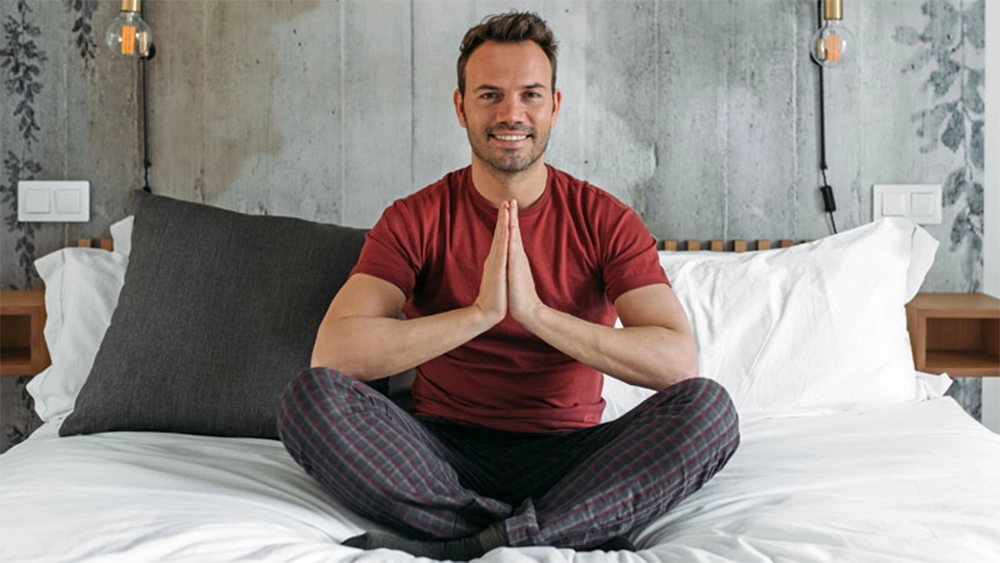Mindfulness meditation for drug recovery has been used for years to achieve better mental and physical well-being for those who have a drug addiction. Today, drug rehab facilities even use this in treating drug addiction.
It is easy to think of meditation as something that monks or new-age people would do. However, this practice is not just for these groups. It is not a superficial thing that’s mystical or magical.
There have been plenty of studies about meditation. And many of them concluded that meditation is highly beneficial for the people who practice it regularly. The first significant benefit of meditation is that it’s free and you can do it whenever and wherever you please.
You can do it on your own or with a group. Meditation for drug recovery can be for anyone, especially those who want to break free from their addictions.
So, how can this ancient practice help in drug addiction treatment and recovery? We will share with you vital pieces of information about the practice of meditation in this article. We’ll try to examine the effects of meditation on drug recovery as well as its benefits. Lastly, we will share with you how you can practice meditation even when you haven’t tried it before.
Understanding Mindfulness Meditation
People who practice mindfulness meditation focus entirely on the present. Being able to concentrate on what’s here and now is called mindfulness. When doing meditation for drug recovery, practitioners focus their attention on their breathing, various parts of the body, or particular phrases or words.
For a lot of people, it’s easy to dismiss the practice of meditation as something that’s fluff. However, there are scientific explanations when it comes to the benefits of meditation. With regular exercise, meditation can help people to be more aware of the present moment. This way, they will be able to examine their feelings and thoughts more carefully.
Studies state that meditation can help people regulate their emotions, promote positive moods, fight depression, manage stress, and relieve pain. For someone who is going through addiction treatment and recovery, meditation can be beneficial.
You can use meditation for drug recovery in combination with the meds that the doctor will prescribe to combat mood problems. Issues with depression and anxiety may need medications. To better train the mind to be in control, meditation for drug recovery can be beneficial.
Why Mindfulness is Important
If you are addicted to a substance, the initial step to take is to know the emotional root cause of it. You must understand why you started using the drug. For example, it could be pessimism, anxiety, depression, or fear that led you to drug use.
Often, such negative thoughts come from a mind that desires more. We feel as though the cure for your unhappiness is if you have more money or a better job. Sometimes, we think that if we get more recognition or we get more power, we’ll be happier.
That’s the problem because we are causing ourselves to suffer from unhappiness. We desire things that we cannot easily have. There are also times when we cling to something that is already gone. And so we are filled with regret and longing.
When we think about the things that should have been or what ought to have been, the unwholesome emotions take over. We start to feel jealous, depressed, or angry. That is not healthy at all because it does nothing to us but make us feel bad about our lives.
Practicing Mindfulness to Combat Unhappiness
Practicing mindfulness meditation is a way of helping us develop the ability to know and understand what we value. By doing so, we will be able to let those negative attachments go. We can then put an end to our suffering.
In the process of being mindful, we can learn about the areas where we resist. Once we know these, we will become more aware of when they emerge so we can reject them. Thinking negative thoughts cannot be entirely avoided, though, but we can try.
Desiring things is a significant part of what it means to be human. Because of desire, we strive to do more and be something more than what we currently are. However, in spite of our successes, we still suffer from unhappiness and discontent.
For some of us, we try to drown our unhappiness and other negative feelings with substances that can make us feel better. Some may turn to alcohol, while others try using illicit drugs. That is dangerous as this can lead to addictions.
If you are dealing with an addiction and you’re looking for ways to address it, maybe meditation for drug recovery is for you. Before you dismiss this idea, it may benefit you to know a thing or two about it first. This way, you will be better equipped to assess if this method will be beneficial for your addiction recovery.
Mindfulness Meditation for Drug Addiction Healing and Recovery

Many recovering addicts experience a sort of disconnection with their minds and their bodies. That is because drug use numbs and disconnects you from them. Many studies have focused on mindfulness meditation and what it can do for addiction healing and recovery.
Such studies have shown that meditation for drug recovery can have a specific effect on our fight-or-flight mechanism. That is our body’s natural response when we are in a stressful or life-threatening scenario. Even though this is our survival mechanism, we also experience this whenever we are physically stressed or when challenged by the addiction recovery process.
When we face chronic stress, we have elevated levels of cortisol. Cortisol is our primary stress hormone. When we have high cortisol levels, and we do nothing about it, it may cause us to suffer from illnesses. Some of the effects of this are depression, anxiety, trouble sleeping, and panic attacks.
Why Practice Mindfulness Meditation?
Mindfulness meditation can be beneficial for you to address negative thoughts and feelings, as well as the effects of chronic stress. Studies have shown that practicing mindfulness meditation can help in decreasing cortisol levels. And in doing so, you will be able to manage your stress better.
With a decrease in the level of cortisol, your body will have the opportunity for homeostasis or achieve a balance. You will then be able to make a state of restful awareness. This state will allow your body to recover and heal.
You can address the effects of the fight-or-flight response. The increased blood pressure and heart rate, as well as the suppressed immunity, can normalize. In short, restful awareness is that state wherein both your mind and your body can start to heal themselves.
How to Practice Meditation for Drug Addiction Recovery
When you practice meditation for drug recovery while you’re in drug addiction treatment, you’ll get to enjoy the positive effects that it will have on your well-being. The fact is that meditation can be the alternative to your substance of choice. Yes, practicing meditation can allow you to achieve that high that you get from drug use.
While you’re meditating, the brain’s prefrontal cortex is activated. That promotes the production of endorphins or the chemicals that make you feel good. Meditation can also help in regulating neurotransmitters. That means that you will feel more relaxed, positive, and upbeat.
The natural high that you get from practicing meditation is the same as the high feeling that runners experience. The meditation high may even be more intense as you practice it more and more. Another thing about this pleasurable feeling is that it won’t come with a crash or an extreme shift in your mood.
The high that you feel from meditation can sustain the pleasurable feelings even after you’ve finished meditating. Practicing meditation is an excellent way of tapping into your feelings and thoughts. You will also feel more enlightened, creative, and energetic.
Learning How to Meditate During Recovery
When you are in recovery from an addiction, you can take meditation for drug recovery classes. There are many ways that you can learn how to meditate. Ask your healthcare provider if they offer this in their inpatient addiction treatment centre. If you want to start immediately, there are easy steps to do it. Let’s take a look at them.
- Find a place that is quiet so you won’t be distracted.
- Look for a comfortable spot where you can sit. You can do this cross-legged. You may also sit on a sofa or chair as long as it is convenient for you. Try not to lie down so that you won’t get sleepy.
- You may close your eyes, or you may focus on something in front of you.
- Take deep breaths. Inhale through your nose and exhale through your mouth.
- Focus on your breathing. Take note of each moment you inhale, and exhale.
- Whenever your mind begins to wander, don’t be hard on yourself. Just return to focusing on your breathing.
To begin with, you may try to sit silently and pay attention to your breathing for around five minutes. As you go on and develop your ability to focus, you can increase your meditating time to ten minutes, twenty minutes, and so on.
When you have mastered the basics, you can try the other different types of meditation for drug recovery techniques. Trying them out will allow you to discover which ones you like best. There are meditation videos and tutorials that are available on the internet. You can try those while you’re at home so that you can continue your practice of meditation.
Meditating while you’re in recovery from addiction will help you in your way of dealing with the challenges of the treatment. Meditation can help you expand the strategies and skills that you have learned while you’re in the addiction rehab centre.
Benefits of Meditation for Recovering Addicts
As someone who is recovering from addiction, you should understand that meditation for drug recovery alone won’t be able to treat the illness. However, if you practice meditation along with other treatment options, you will find that there are many benefits that you can get from it. Here are some of the benefits that you can enjoy from practicing meditation.
Less Stress
If you feel so stressed from the challenges of addiction treatment and rehab, meditation is undeniably your go-to activity. It can lessen feelings of anxiety and stress. Studies have shown that mindfulness meditation can significantly reduce the stress that you’re experiencing. It becomes more useful as you practice meditation more and more.
Another research states that with meditation, the brain tissue that influences worrying and anxiety lessens in density. Meditation may be the key to tame your stress. Consider practicing this technique so you can enjoy this benefit.
Feel Better

If you want to feel more energetic and happy, try practicing meditation. With this activity, you will experience an increase in your mental functioning. You will also think that there is an improvement in the way that you see yourself.
Some studies show that when you combine meditation with tai chi and yoga, your quality of life will improve. Just remember to practice these activities regularly so that you will get the best results.
Increase Empathy and Connectedness
Drug use disconnects the addict from the people and the world. When you are addicted to as substance, your focus is on using the drug and getting high. You don’t care so much about your social life or any other aspect of your life.
With meditation for drug recovery, specifically compassion meditation, there is an opportunity to enhance the parts of the brain that are responsible for empathy. Try doing this kind of meditation with a class, and you will feel more connected with the people around you.
Improves Your Focus
When you are meditating, try to focus on how the practice can absorb you right into the present moment. Mindfulness will naturally occur to us whenever we practice meditation. It is because we reach a specific flow state. It is the state where our mind is in full harmony with itself.
There was a study about the effects of meditation, and it found that regular practitioners of meditation have better attention and concentration compared to those who do not. Even if you meditate for a brief period, you can still enjoy this benefit. You will be able to focus on the things at hand better.
These benefits are just some of the many that you can enjoy once you start practicing meditation. You will learn that there are a lot more advantages that you can get out of meditating. What you should do right now is to learn as much as you can about meditation so you will know how to do it properly.
How Does Meditation Help With Addiction Treatment?
All of us have our addictions. It could be television, chocolates, junk food, sodas, coffee, cigarettes, or illicit drugs. Whatever your addiction is, if you want to break free from it, then you can consider practicing meditation. If its benefits do not convince you, here are more pieces of information on how meditation can help treat addictions.
You’ll Enjoy a Natural High
Most, if not all, of the mind-altering drugs, can cause a high. However, the downside of it is the crash that you experience when the high disappears. If you are addicted to something, then you know this feeling very well. There is a way to still get that high without crashing. Meditation can give you that natural high and you will love it because you won’t have to dread the crash after.
A study about the parts of the brain related to addiction states that the happiness center of our minds becomes intensely stimulated whenever we take our substance of choice. It then becomes under-active during the times when we are not consuming the drug, beverage, food, or doing addicting activities.
With meditation, we can stimulate the brain. Doing so will train it to be happy and get that natural high. You will find that you don’t need alcohol, drugs, cigarettes, and other addictive substances to be able to feel good.
Meditation can help the body produce more endorphins which are our happiness chemical. Another great thing about practicing meditation is that you don’t have to spend money to get this high. Unlike consuming addictive substances where you have to pay a good deal to get your fix, meditating can be done anywhere and anytime that suits you. Plus, it’s perfectly legal.
Meditation Produces Brainwaves that Treat Addiction
There’s a study about addiction recovery patients who were provided with EEG biofeedback training. It is when the brainwave patterns of the patients get into a higher state of consciousness. In the study, they utilized alpha and theta waves. The result of the study was that a year later, up to 70% of the patients were already drug-free.
Biofeedback therapy is expensive. But with meditation, you can get your mind to go to the alpha and theta state without spending a fortune. When you are meditating, the brainwaves that dominate are the alpha and theta. Imagine if you can meditate regularly or every day, you can enjoy the benefits of reaching this state of consciousness. It will help in beating your addiction.
You Will Control Your Cravings Better
As someone who is addicted to a particular substance, you surely know that the uncomfortable feeling whenever you crave the drug. You can’t think of anything else, and you want to satisfy the urge as soon as you possibly can. Otherwise, you’d feel irritable and anxious.
With meditation for drug recovery, you can better control your cravings. Instead of the desires controlling you, you will learn how to manage them. It is because the practice of meditation is one of the ways that you can control your mind. You can start to have control over your thoughts and desires. It will surely help you whenever you feel the need to smoke, drink, or take drugs.
Natural Dopamine Production
Whenever addicts consume their substance of choice, dopamine floods areas of the brain and causes them to feel euphoric. At this time, the addict feels the “high.” And then during the crash, the dopamine levels are lower than average. That is why they experience the “crash.”
During the crash, the brain seeks more of the dopamine boost that the substance brings. It is the cause of this vicious cycle of getting high, crashing, and getting high again. The brain wants to feel good more and more, that’s why the drug is taken in more copious amounts and more frequently.
Meditation is known to be one of the best activities that release dopamine naturally. When you’re trying to kick a bad habit, you can try meditating, so you have a healthier alternative to consuming illicit substances. In a study, the researcher found that participants who meditated had higher levels of dopamine. It was 65% more than the other group who did not meditate.
Another essential thing to take note of is that when you regularly practise meditation, you still get to enjoy a healthy amount of dopamine levels. So, this means that even when you’re not meditating, you will always feel great. Therefore, there’s no need to worry about crashing just like when you were taking illicit substances.
Traditional Treatments Become More Effective

While meditation can do a lot of things for your mind and body, you should remember that it’s not the only cure for addiction. Depending on what you are addicted to, there are specific treatments that cater to particular substances.
What you have to keep in mind is that meditation meditation works best when practiced in combination with the other treatment options. For example, maintaining a healthy diet, working out, and attending behavioural counselling sessions are some of the elements of addiction treatment.
When you combine meditation with those elements, you will be able to focus more on your goals. Meditation’s benefits will help you to face the challenges of overcoming addiction. The process of addiction treatment is not going to be easy. But if you have activities like meditation, you will have an exercise that can help you train your mind to focus.
Makes You Handle Stress Better
Most of the addictions come from stress. People want to address the importance, and so they turn to substances to relax them. Eventually, this leads to cravings. With meditation, you can learn how to handle stress healthily.
When we face stress, we feel anxious, depressed, and angry, and we may even have problems with sleeping. Taking alcohol or illicit substances is a way of coping with stress. However, it is not a healthy way to deal with it.
Meditation for drug recovery is one of the ways that you can cope with the stressful problems that you face. When you meditate, you allow yourself to relax. While this may seem simple, our mind and body need to be able to relax. It is because we will be able to think more clearly.
When we’re not overwhelmed by our problems, we can sort out the issues that we’re facing. With a clear mind, we can focus on what’s essential and figure out ways how we can address each of the problems that have been causing us stress.
A Guide for Beginners on How to Meditate
When you start to practice meditation for drug recovery, you will notice that you’ll begin to form other good habits. It may vary for every individual, but the overall effect is good. You will feel more peaceful. Your focus will improve, and you will worry less about problems. You’ll also notice that you are more appreciative as well as attentive to the different aspects of your life. Your life won’t be perfect, but it will be far better than how it once was when you have been dealing with your addiction.
Perhaps the best benefit that you will get from practicing meditation is that you will be able to understand yourself better. To be specific, you will realize your mind more. Before you began meditating, you probably didn’t know what was going on in your account. Things are just on auto-pilot. But with meditation, you will be allowed to take control of your head, and therefore, your life.
You can start to make more conscious decisions for yourself. You will have a better understanding of your mind and your being. Doing so, you will have more freedom and flexibility because you don’t just do things on auto-pilot; following your mind’s commands. You are in control, and you can make sound decisions. One of the most important ones is whether to stay sober or not. That is an everyday decision to make. And you have to be conscious of that.
So, as a beginner in meditation, here are some of the things you can do to start practicing this activity. You don’t need to do this all at once during your first try. You can try each step one at a time. Whenever you feel that you can integrate the other actions, then try to do so. What’s vital is that you are comfortable, and you have mastered the basics before you move on to the next step.
Give Yourself At Least Two Minutes
This step is so easy that it sounds ridiculous. But don’t take this step lightly. The two minutes will be the start of your meditation practice. Yes, you can meditate for just a couple of minutes, and it’s perfectly fine. Do this daily for a week. When you can commit more time, then try to meditate for more extended periods. You can move to five minutes every day.
Remember not to rush things. If you can only commit to two minutes, then that’s alright. Don’t force yourself to have meditation sessions for twenty minutes immediately. It might frustrate you because your focus and concentration are not yet ready for a meditation session that long. Focus on your breathing and only think of that. When your mind starts to wander, you can stop. Practice meditation again the next day.
Meditate First Thing When You Wake Up
Starting a new activity like meditation can be exciting. However, don’t overcommit. You can tell yourself that you’ll meditate every day, but you may forget to do it diligently. Therefore, a trick to make sure that you’ll practice meditating is if it becomes the first order of business when you wake up.
Upon waking up, find a place to sit where you will be comfortable. Try not to lie down because you might fall back to sleep. Set your phone or alarm clock to set off after two minutes. In those two minutes, focus on your breathing. Put your mind into every inhale and exhale that you make within those two minutes. Once done, you can go about your day as usual.
Don’t Worry So Much If You’re Doing It Right
When you meditate, don’t get caught up with the hows. For example, don’t spend so much time thinking about where you should sit and how you should sit. These are all essential details, yes, because you have to be comfortable. But you will know more about your preferences once you start meditating. So, for the first few days, start meditating. Make adjustments to your environment as you go along.
You also don’t have to buy anything fancy for meditation. That’s the beauty of this practice because you don’t have to spend on it. You only have to make time for it which is two minutes to start. Next is to find a place where you can sit quietly and where there are no distractions. When you are meditating for long periods, you can start considering getting a cushion and other things that will help you focus more.
Assess Your Feelings
After your first few meditation sessions, check how you feel. Ask yourself what your body feels. How was your mind after the meditation session? Did it feel more relaxed, or did you think that there were no significant changes? Do you feel more anxious or tired?
Whatever your feelings are after the meditation, it’s completely alright. If you think that it doesn’t do you any right, then that’s what’s true and real for you. You don’t have to convince yourself that meditation is working well for you if it isn’t. However, do give it some time. Don’t give up immediately. Try it for a week, then a month, and then assess if it is a kind of activity that you like.
Focus on Your Breathing
Once you are alright with the basics, check if you are comfortable. When you are ready to meditate, try focusing on your breathing. Count them if you can. Focus on how you breathe in and try following it as it flows through your nose and into your lungs. Count that as “one.”
When you breathe out, follow your breathing as well and count that as “two.” Repeat this counting every time you inhale and exhale until you reach “ten.” After the tenth round, you can return to “one.” Do this for the whole two minutes that you’re meditating.
Return to Your Focus When Your Mind Wanders
Something that you have to accept when you start the practice of meditation is that your mind is going to wander. But don’t get frustrated or impatient with yourself. Whenever you notice that your account is already wandering, smile to yourself and then focus back on your breathing.
Start again by counting “one” still. If you’re feeling frustrated, don’t be. Typically, your focus drifts off. It will frequently happen if you’re starting with the practice of meditation. As you practice it more and more, you will be able to pay attention better.
Keep a Positive Attitude
Whenever you feel that some feelings and thoughts emerge while you’re meditating, don’t think about them negatively. Instead, embrace them with a positive attitude. Don’t believe that these feelings are intruders.
Tell those thoughts and feelings that you will set them aside for now, but you will give them their time. It is in this way that you can focus more on your two minutes of meditation. You don’t have to dismiss anything that emerges as you’re doing it. You can tell them that they will have their own time.
Don’t Focus on Having a Clear Mind
You may have heard before that when you meditate, and you should have a clear mind. You should be able to stop your thoughts and focus. While this is ideal, this is not the only goal of this practice. Every one of us has ideas. Therefore, it’s perfectly normal if thoughts come up while you’re meditating.
Don’t be annoyed or irritated with yourself that you can’t shut out your thoughts. That would be like stopping the water. The point of meditation is for you to be able to practice control over yourself. During the times when you are just starting, don’t expect that you have already mastered this ability to control your mind. Give it time. Just stay focused on your breathing for two minutes and enjoy the process as you go along.
Be Patient in Knowing Yourself
The practice of meditation for drug recovery is not all about knowing how to focus. Most importantly, meditation is about learning the ways how your mind works. Do you ever wonder what’s going on inside your head? Is it all foggy and chaotic? Is it difficult to understand?
You may get frustrated at first because looking at your mind would feel like going through a dense jungle where you don’t know where to go. With meditation, you can start carving a path for yourself. The strange wilderness of your mind becomes more and more familiar. The details become vivid, and you’re not as scared as you once were. You will better understand your thought processes.
Be Committed
When you try something, not just meditation, do your best to give it time before you decide that it’s not for you. Meditating for two minutes every day isn’t that big a commitment. It won’t cost you anything, and there’s no harm in trying it out.
With all the great benefits that you can get from meditation, the only thing you have to give it is time and commitment. Do it for at least a month. Hopefully, you’ll do it with seriousness and sincerity so that you will be able to assess if it’s something that you like genuinely.
Smile

When you finish your two minutes of meditation, don’t forget to smile. Think about the things you are grateful for. Be thankful that you were able to give yourself two minutes to relax and focus on the present.
Each time that you meditate is an opportunity for you to get to know yourself more. It is a chance for you to befriend yourself, to forgive yourself, and to tell yourself that you’re grateful. Be thankful for every opportunity that you get each day to meditate, whether it’s for two minutes or twenty.
Final Thoughts
Meditation for drug recovery is not a very difficult practice. Anyone can do it, especially those who are going through addiction treatment. When you are in recovery from addiction, try as many activities as you can. It is so that you can find something that can replace your bad habits.
Meditation is one of the most straightforward practices that you can try when you’re in addiction recovery. Hopefully, the steps we’ve shared above on how to meditate can guide you. Remember to take it slowly and be patient with yourself.
Don’t get immediately frustrated. Take each opportunity as a chance to learn more about yourself, mind and body. Eventually, you’ll be able to spend more time meditating, and you will enjoy the many benefits that meditation for drug recovery has to offer.
If you have any questions about meditation for addiction treatment, chat with us today, and we’ll be happy to assist you in your inquiry.







